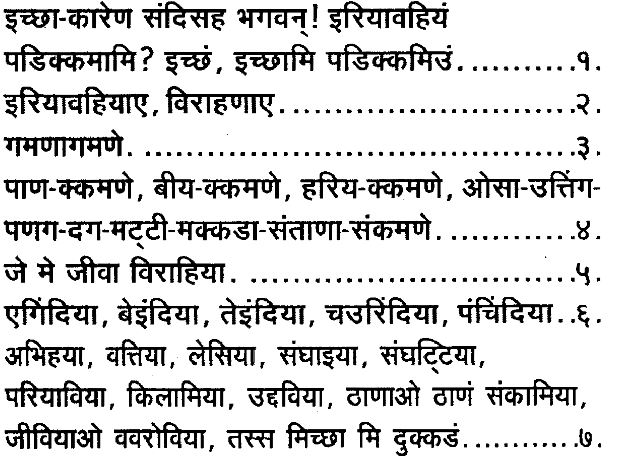Iriyāvahiyā Sutra
This sutra (hymn) begins with a disciple humbly requesting atonement for any sins committed whilst doing activities and the Guru giving the due consent.
It is a form of pratikramana – atonement for sins inadvertently committed whilst doing activities and reminding oneself to be vigilant at all times in the future.
To feel remorse for wrongful deeds one needs to have discrimination between what is right and wrong. This sutra outlines various ways violence could have been committed to various types of living entities. A mistake can be classified in two ways:
(a) to do deeds that are not worthy / permissible
(b) not to do deeds that are worthy of doing
The essence of the sutra is that any activity that anyone does should not result in pain /sorrow to any other living being.
In the Avashyak commentaries, Acharya Haribhadrasuri refers to this sutra as “Gamna-atichar pratikramana” whereas in the Dasvaikalika commentaries it is referred to as “Iryapath Pratikramana”. Acharya Hemchandrasuriswarji Maharaj refers to this sutra as “Alocana Pratikraman”.
It is recited often during Sāmāyik, Pratikramana, Caityavandan, etc. Moreover, whenever ascetics return from any activities or accidentally drop something, they recite this sutra.
The story of Aimutta Muni illustrates the importance of this sutra and how with genuine remorse he recited Iriyāvahiyā Sutra and attained omniscience.
This sutra encapsulates 1,824,120 divisions of atonement. The calculation behind this figure is as follows: (1824120 = 563 x 10 x 2 x 3 x 3 x 3 x 6)
- Living beings are classified into 563 different forms. Click here for a detailed analysis of 563 types of living beings
- The prayer enumerates 10 ways by which violence could be committed to living organisms
- Abhihayā → kicked by feet
- Vattiyā → covered by dust
- Lesiyā → trampled on ground
- Sanghāiyā → collision with each other
- Sanghattiyā → with minor touch
- Pariyāviyā → by troubling them
- Kilāmiyā → by causing distress
- Uddaviyā → by causing fear / frightening them
- Thānāo thānam sankāmiyā → by shifting them from one place to another
- Jiviyāo vavaroviyā → by depriving them of their life
- 2 inclinations of the mind
- Raag (राग) → desires / attachment
- Dwesh (द्वेष) → hatred
- 3 Yogas (योग, activities)
- Mind
- Body
- Speech
- 3 Karana (instrument or means of action)
- To do
- To get others to do it
- To praise / encourage others to do
- 3 phases of time
- Past
- Present
- Future
- In the witness of 6 entities
- The 5 parmesthis (“supreme beings”)
- Arihant
- Siddha
- Acharya
- Upadhyaya
- Sadhu
- The self (one’s own soul)
- The 5 parmesthis (“supreme beings”)


Icchā-kārena sandisaha bhagavan! iriyāvahiyam paddikamāmi?
iccham, icchāmi padikkamiu ……1
Iriyāvahiyāe, virāhanāe ……2
Gamanāgamane ……3
Pāna-kkamane, biya-kkamane, hariya-kkamane,
osā-uttinga-panaga-daga-matti-makkadā-santānā-sankamane ……4
Je me jivā virāhiyā ……5
Egindiyā, beindiyā, teindiyā, caurindiyā, pancindiyā ……6
Pariyāviyā, kilāmiyā, uddaviyā, thānāo thānam sankāmiyā
jiviyāo vavaroviyā, tassa micchāmi dukkadam ……7
Oh Bhagawan! I voluntarily seek your permission. Can I do pratikramana for the sins committed whilst coming and going?
Guru gives their consent. I accept your order. I wish to do pratikramana ……1
For the faults committed:
- while walking ……2
- while coming and going ……3
- by suppressing / trampling or walking over:
- living beings
- seeds
- green vegetation
- dew
- ant-hills
- moss, algae, fungi, etc
- wet soil, bog, etc
- spider’s web ……4
- in giving pain, anguish or sorrow to living beings ……5
- 1 sensed
- 2 sensed
- 3 sensed
- 4 sensed
- 5 sensed ……6
- by kicking living beings, covering them with dust, trampling them
on the ground, colliding with them, hurting them with a little touch,
troubling them, causing them distress, frightening them, displacing
them from one location to another, depriving them of their life…
MAY ALL THESE MISDEEDS OF MINE BECOME FRUITLESS ……7
References:
1. Prabodh Tika by Param Pujya Panyas BhadrankarVijayji Maharaj & Param Pujya Munishree Kalyanprabhavijayji Maharaj
2. Pratikramana Sutra With Explanation (Part 1) by Muni Nirvana Sagar
3. Jeev Vichar compiled by Acharya Hemchandrasuri (VS 2061)
4. Internet
I apologise and seek pardon for any unintentional errors in translation of the verses.